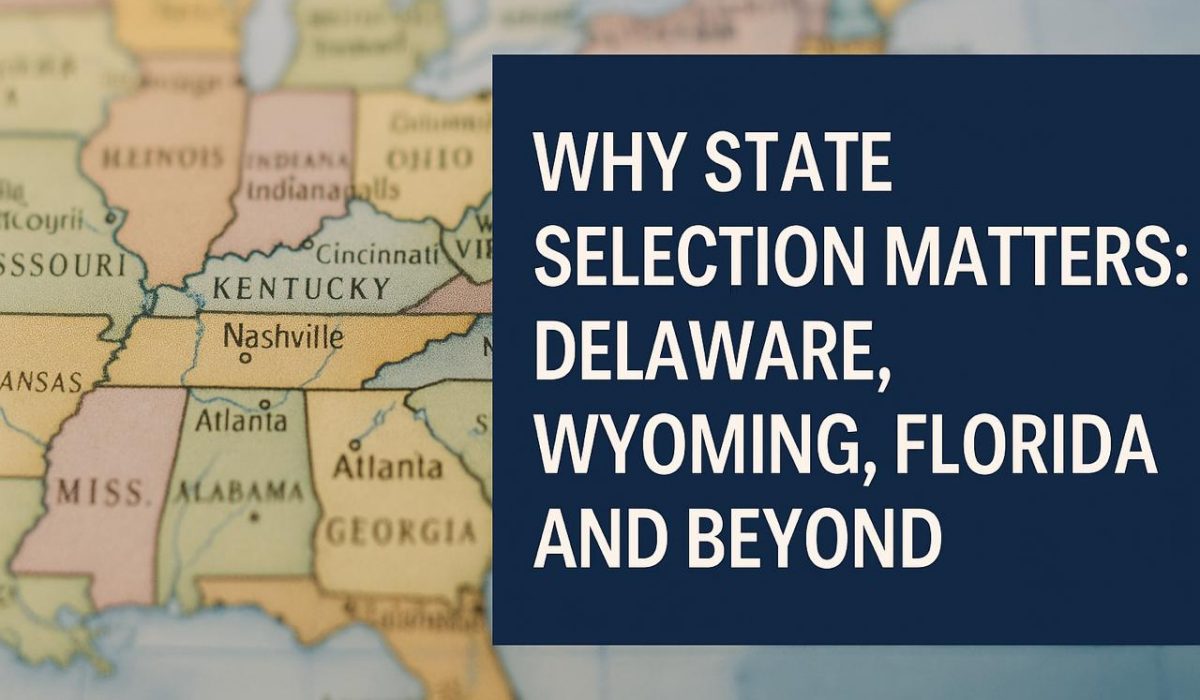Why State Selection Matters: Delaware, Wyoming, Florida and Beyond
An Exclusive Legal Guide by Mansour Legal Services, MLS Global APC
Incorporating a business in the United States is a powerful decision, but choosing the right state of formation is just as important. While the federal framework for taxation and compliance remains constant across the country, each U.S. state applies its own laws to entity formation, compliance filings, franchise taxes, annual report requirements, and levels of privacy for business owners. Whether you’re an international entrepreneur launching your first U.S.-based operation or a domestic founder seeking the most efficient structure, understanding state selection is essential to protecting your business and maximizing its potential.
This comprehensive legal article, exclusive to MLS Global APC, outlines the most critical aspects of choosing the proper state to incorporate or register your U.S. entity in 2025. It includes a detailed analysis of Delaware, Wyoming, Florida, California, and Texas, along with niche strategies involving Nevada, New Mexico, and Montana. Citing official government sources, IRS guidance, U.S. Chamber of Commerce data, and state business divisions, this guide provides practical insight based on the legal experience of MLS Global’s multijurisdictional client base.
1. Why State of Formation Matters
In the United States, there is no federal incorporation system. Each state has its own Secretary of State (or equivalent) that oversees the registration, renewal, and compliance of entities formed under that jurisdiction. Choosing a state determines:
- Which courts have jurisdiction over legal disputes
- What annual filing requirements and fees you must meet
- What taxes your entity is subject to at the state level
- Who appears on public records, including members, managers, and owners
- What protections you receive regarding business liability and privacy
Per the U.S. Small Business Administration (2024), over 70% of new U.S. corporations are formed in just five states: Delaware, Wyoming, Florida, California, and Texas (U.S. SBA, 2024).
For international founders, the state of formation affects everything from opening a U.S. bank account, applying for an EIN, satisfying payment processor verification, and accessing investor capital.
2. Delaware: Home of the Corporate Elite
Delaware has long been regarded as the legal epicenter for corporate formation. Over 65% of Fortune 500 companies are incorporated in Delaware, and more than 90% of all IPO-bound startups are Delaware entities (Harvard Law School, 2023).
Advantages:
- Specialized Court of Chancery, a business court without juries and with expert judges
- Extensive and predictable corporate case law (Del. Gen. Corp. Law §101-§398)
- Support for multiple share classes, preferred equity, and convertible instruments
- Well accepted by venture capitalists, accelerators, and angel investors
Disadvantages:
- High franchise tax for corporations with complex ownership (up to $250,000/year)
- Registered agent required even if you have a physical office elsewhere
- Not ideal for non-VC service businesses or simple LLCs
MLS Insight: Delaware is best when you’re preparing for investor funding, large-scale operations, or launching a tech company with exit potential. Stripe Atlas and Clerky often default to Delaware filings, but this must still be paired with legal compliance reviews.
Cited Source: Harvard Law School. (2023). Delaware and the Market for Corporate Charters. Harvard Law Forum on Corporate Governance.
3. Wyoming: Lean, Private, and Foreign Founder Friendly
Wyoming is often seen as the most efficient and privacy-focused state for LLC formation, particularly for nonresident aliens and international consultants. Its statutes prioritize asset protection, anonymity, and ease of compliance.
Advantages:
- $60 annual report fee—one of the lowest in the country (Wyoming SOS, 2025)
- No state income tax on businesses or individuals
- Anonymous ownership allowed; managers only need to be listed
- Favorable asset protection statutes (Wyo. Stat. Ann. §17-29-201 et seq.)
Disadvantages:
- Some banks and fintech platforms are unfamiliar with Wyoming companies
- Limited startup capital ecosystem compared to Delaware or California
- State law assumes passive ownership, not ideal for active daily operations
MLS Insight: Wyoming is an ideal choice for foreign consultants, e-commerce sellers, and real estate holding structures. However, pairing it with a Florida or Texas operational address may improve functionality.
Cited Source: Wyoming Secretary of State. (2025). Annual Filing and Compliance Resources. https://sos.wyo.gov/
4. Florida: Strategic for Physical Operations
Florida is the third-largest U.S. state by GDP and population. It is ideal for businesses with real staff, warehouses, or physical locations. It also attracts nonresident owners from Latin America, the Middle East, and Europe.
Advantages:
- No personal income tax
- Simple online filings (SunBiz.org)
- Business-friendly courts and predictability
- Robust fintech and e-commerce support
Disadvantages:
- Member/manager disclosure is public
- $138.75 annual report required by May 1st to avoid dissolution
- Some local licensing and zoning complexity (especially Miami-Dade and Hillsborough counties)
MLS Insight: Many of our clients use Florida as their operational nexus, even if the entity is formed in Delaware or Wyoming. Banks in Florida are generally more open to nonresident applicants.
Cited Source: Florida Division of Corporations. (2025). Annual Report Filing and Payment Guide. https://dos.myflorida.com/
5. Texas and California: Big Markets, Bigger Obligations
Texas
- No personal income tax
- Large commercial litigation system
- Sales tax and franchise reporting required
California
- $800 minimum franchise tax even if no revenue
- Mandatory business license at city or county level
- Strong privacy protections for consumers but less so for business owners
- Preferred by West Coast startups due to ecosystem proximity
MLS Insight: We recommend California only if you are physically located there or have unavoidable nexus. Otherwise, the compliance burden outweighs the benefits.
Cited Source: California Franchise Tax Board. (2025). Franchise Tax Rules and Minimum Payments. https://www.ftb.ca.gov/
6. Hidden Gems: Nevada, New Mexico, Montana
Nevada once rivaled Wyoming for anonymity, but high fees and changes to BOI compliance rules have reduced its appeal.
New Mexico allows anonymous LLCs with extremely low costs but is not supported by most U.S. banks or payment processors.
Montana is used mostly for vehicle holding LLCs, especially for foreign persons buying RVs, classic cars, or aircraft for U.S. use.
7. What To Ask Before Choosing a State
- Will I have employees or inventory in a specific state?
- Do I need to maintain privacy?
- Will I seek funding in the next 12 months?
- Will I run a tech company with equity splits?
- Do I want to avoid state-level taxes?
8. Federal Filings Are Still Mandatory
Regardless of where you incorporate, you must still:
- Obtain an EIN from the IRS
- File BOI Report with FinCEN (FinCEN, 2024)
- File IRS Forms 1040-NR, 5472, or 1120 depending on structure
- Comply with OFAC, KYC, and FATCA for banking and reporting
Cited Source: FinCEN. (2024). Beneficial Ownership Reporting FAQs. https://fincen.gov/boi-faqs
9. Strategy Combinations
- Delaware Formation + Florida Operations
- Wyoming LLC + Texas Bank Account
- Florida LLC + DBA in California
- Dual LLC Holding Structures for real estate and IP management
10. Final Thoughts
There is no “perfect” state for every business. But choosing the right state for your specific needs, based on your operational footprint, residency, growth strategy, and compliance bandwidth, will determine whether your business scales smoothly or struggles with legal, tax, and administrative friction.
At MLS Global APC, we specialize in structuring U.S. entities for international and domestic clients. From Wyoming privacy vehicles to Delaware C Corporations, from Florida retail logistics to California consulting firms, we know how to align your entity structure with your long-term goals.
For legal guidance you can trust, reach out to our team and let us build your foundation the right way.
Choucri Mansour
Principal Attorney
References
Harvard Law School. (2023). Delaware and the Market for Corporate Charters. Harvard Law Forum on Corporate Governance. https://corpgov.law.harvard.edu/
U.S. Small Business Administration. (2024). State-by-State Business Formation Trends. https://www.sba.gov/
Delaware Division of Corporations. (2024). Annual Report and Franchise Tax Guidelines. https://corp.delaware.gov/
Wyoming Secretary of State. (2025). Business Division Annual Filing Requirements. https://sos.wyo.gov/
Florida Department of State. (2025). Division of Corporations – Filing Manual. https://dos.myflorida.com/sunbiz/
California Franchise Tax Board. (2025). California Business Entity Tax Guidelines. https://www.ftb.ca.gov/
FinCEN. (2024). BOI Reporting FAQs. https://www.fincen.gov/boi-faqs
IRS. (2024). U.S. Tax Guide for Aliens (Publication 519). https://www.irs.gov/pub/irs-pdf/p519.pdf
#MLSGlobalAPC




